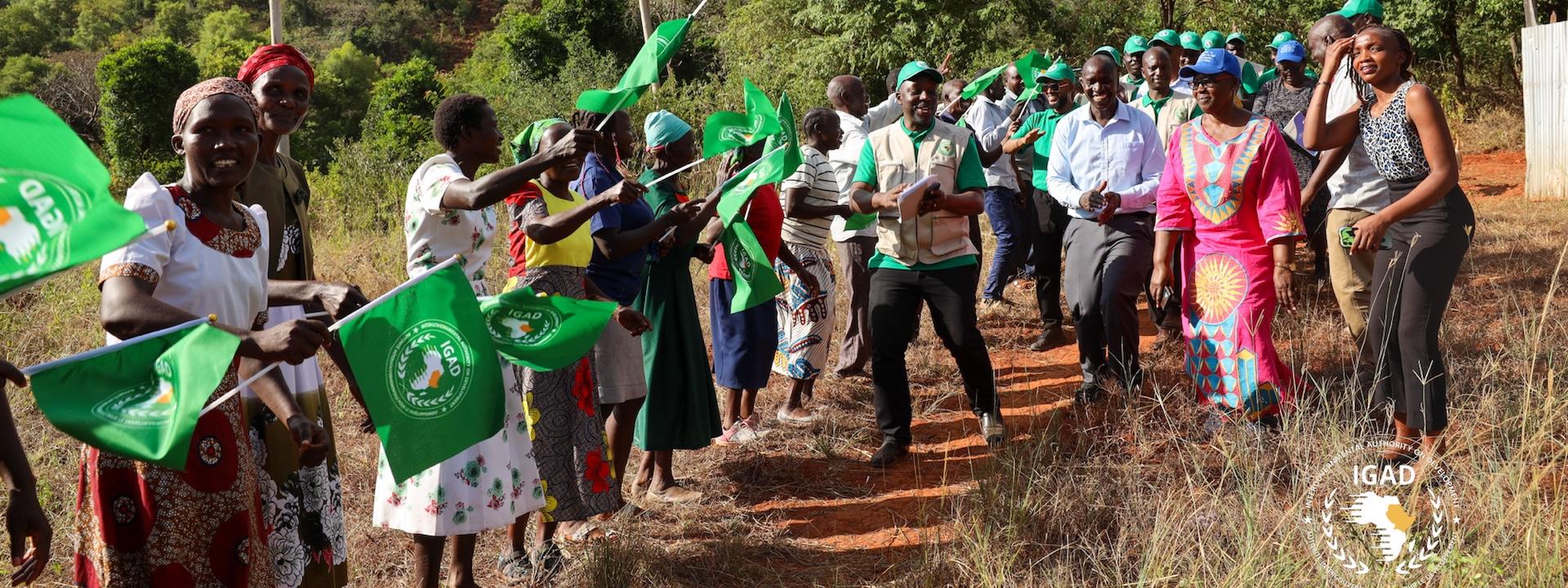November 21, 2024 (Baringo County, Kenya): The Intergovernmental Authority on Development (IGAD) concluded a four-day field visit in Baringo County, Kenya, aimed at documenting and sharing best practices in resilience building under the IGAD Drought Disaster Resilience and Sustainability Initiative (IDDRSI). This visit, facilitated by the “Strengthening the Coordination and Implementation of IDDRSI” (SCII) and “Building Resilience for Food and Nutrition Security” (BREFONS) projects, focused on assessing progress, exchanging experiences, and promoting sustainable solutions across member states.
For over a decade, IDDRSI has spearheaded efforts to enhance the resilience of communities in arid and semi-arid lands (ASALs). These efforts have centred on mitigating vulnerabilities related to food insecurity, poverty, and environmental challenges. Initiatives like the Drought Resilience and Sustainable Livelihoods Programme (DRSLP) and the Rural Livelihoods Adaptation to Climate Change (RLACC) are pivotal in addressing these issues, benefiting thousands of households across IGAD’s member states.
In Kenya, DRSLP has significantly improved water accessibility, crop productivity, and livestock marketing in six ASAL counties, including Baringo, directly impacting over 168,900 households. RLACC complements this work by focusing on climate adaptation strategies such as erosion control, agroforestry, and water catchment protection.
BREFONS further builds on these efforts, promoting food security through infrastructure development, crop diversification, and advanced livestock genetics.
IGAD Deputy Executive Secretary H.E. Mohamed Ware, on behalf of H.E. Dr. Workneh Gebeyehu, emphasised the importance of this gathering:
“This visit is more than a field observation; it is a platform for collaboration, learning, and sharing best practices. Projects like DRSLP, RLACC, and BREFONS stand as pillars of hope, empowering communities in arid and semi-arid regions to build sustainable livelihoods.”
DR. Andrew Karanja, Cabinet Secretary, Ministry of Agriculture and Livestock Development, praised IGAD for its support:
“These multi-national programmes have empowered our communities. We deeply appreciate the IGAD Secretariat’s commitment to both conception and implementation, as well as facilitating this learning and experience-sharing initiative.”
Participants, including IGAD representatives, the Kenyan Ministry of Agriculture, and member state IDDRSI focal experts, observed firsthand the transformative impacts of these projects. Key achievements documented include:
- Drought Resilience and Sustainable Livelihoods Programme (DRSLP):
- Construction of 15 water boreholes, 5 dams, 6 hay stores, and a 400-acre irrigation scheme in Baringo, providing reliable water sources and improved livelihoods.
- Enhanced livestock marketing and crop productivity, addressing both economic and nutritional needs.
- Rural Livelihoods Adaptation to Climate Change (RLACC):
- Distribution of 21,000 mango seedlings to improve tree cover and diversify income sources.
- Integration of climate resilience measures into local development plans, alongside erosion control and livestock restocking efforts.
- Building Resilience for Food and Nutrition Security (BREFONS):
- Development of fodder banks, livestock markets, and climate information systems, strengthening the adaptive capacity of vulnerable communities.
- Promotion of crop diversification and the introduction of improved livestock genetics.
The visit provided an opportunity to collect data through site observations, interviews, and focus group discussions. Key outcomes include:
- Documented Best Practices: Effective strategies and innovations were recorded to inform future resilience-building initiatives.
- Policy and Programme Recommendations: Evidence-based adjustments were proposed to enhance the impact of ongoing and future projects.
- Scalable Models: Successful approaches, such as the Kiboi irrigation scheme and climate adaptation practices, were identified for potential replication in other drought-prone areas.
Participants called for continued efforts in building resilience, including capacity-building for local teams, enhanced data collection, and integration of lessons learned into broader regional strategies. IGAD reaffirmed its commitment to resilience-building and thanked its partners, including the African Development Bank and Kenya’s Ministry of Agriculture, for their support.
This successful field visit underscores the transformative potential of multi-national resilience projects, offering hope and sustainable solutions to communities facing climate and socio-economic challenges.
